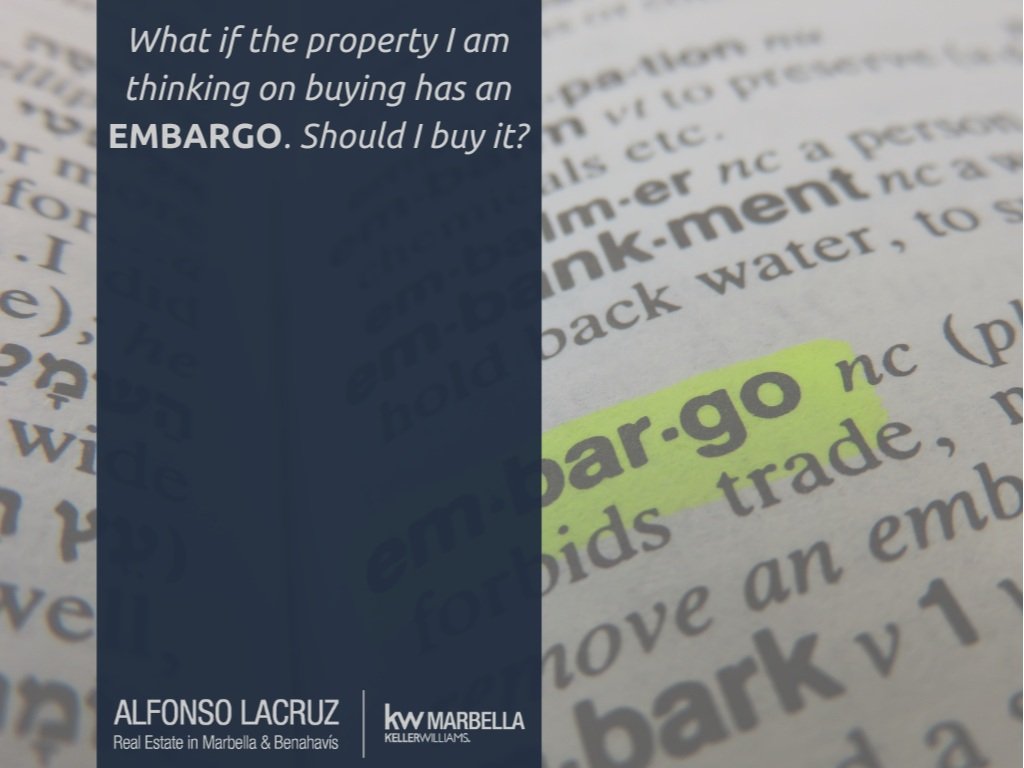A property with one or various embargos registered at the Land Registry can be bought with total security but there are some aspects that have to be taken into account. I will refer only to embargos affecting to properties and not to those affecting to salaries, pensions, bank accounts or other assets. In any case and if you are aware that there is an embargo on a property, I fully recommend working with a knowledgeable lawyer to avoid future complications.
What is an embargo on a property?
An embargo can be understood as a legal action taken against a property for a certain value to enforce the payment of an outstanding debt. They come in the form of a Court order or from a Public Administration—local, regional or national—in Spain. Both the Courts and the Public Administrations have the power to order the seizure of the properties of the debtor to settle the debt and can liquidate the non-monetary assets in public auctions.
Public Administrations embargos and how to clear them
The most common embargos from the Public Administrations come from debts with the Spanish Tax Office (for non payment of income or wealth taxes), the Social Security (for non payment of Social Security receipts) and the Council Authorities (for non payment of I.B.I., rubbish collection or Plusvalia taxes). The steps to clear them are the following:
· Obtain from the Public Administration holding the embargo a payment slip (Carta de Pago) with the full debt, the main debt plus interest plus legal costs, at the day of the signature of the purchasing deed.
· Retain the amount on the payment slip (for the debt with that Public Administration), from the amounts to be paid to the seller at Notary. This retention to pay the debt will be stated in the purchasing deed.
· That payment slip has a deadline on it to pay the debt without additional interest that will give the purchaser some days after the signature of the purchasing deed to pay the debt.
· After signing the deed, go to one of the banks that appear on the payment slip with the slip to pay the debt and keep the receipt of the payment.
· After the payment, the Public Administration issues a certificate for the Land Registry (mandamiento de cancelación de embargo) stating the debt is paid and that the Land Registry can clear the embargo. After presenting that certificate at the Land Registry, the embargo should be cleared.
· It is also recommendable to retain, from the amounts to be paid to the seller, an amount to cover the expenses associated with the clearing of the embargos
Court Order embargos and how to clear them
The Court Order embargos are those coming from the execution of the sentence from a Court process to cover a payment obligation that is not paid voluntarily by the debtor and are enforced by a Court order signed by a judge. The steps to clear them are the following:
· The seller of the property or his lawyer has to contact the creditor to produce a document stating the total debt, including interest and legal costs, at the date of the signature of the purchasing deed.
· From the amounts to be paid to the seller, one of the checks has to be prepared for the creditor for the total amount outstanding at the date of the signing of the purchasing deed. The creditor should go to the Notary to cololect this bank draft that will clear the debt and sign a settlement document stating the clearing of that debt.
· At the Notary, the creditor should produce a document signed by his lawyer and his court agent where they request the Court to lift the embargo as the debt is paid. Additionally, it is also recommended that they produce a document stating that, with that payment, they renounce to additional claims.
· With that request, the Court will produce a certificate signed by the judge for the Land Registry (mandamiento de cancelación de embargo) stating the debt is paid and that the Land Registry can clear the embargo. After presenting that certificate at the Land Registry, the embargo should be cleared.
· It is also recommendable to retain, from the amounts to be paid to the seller, an amount to cover the expenses associated with the clearing of the embargos.
Since each particular case is different, it is fully recommended that you check your own details with your lawyer.

